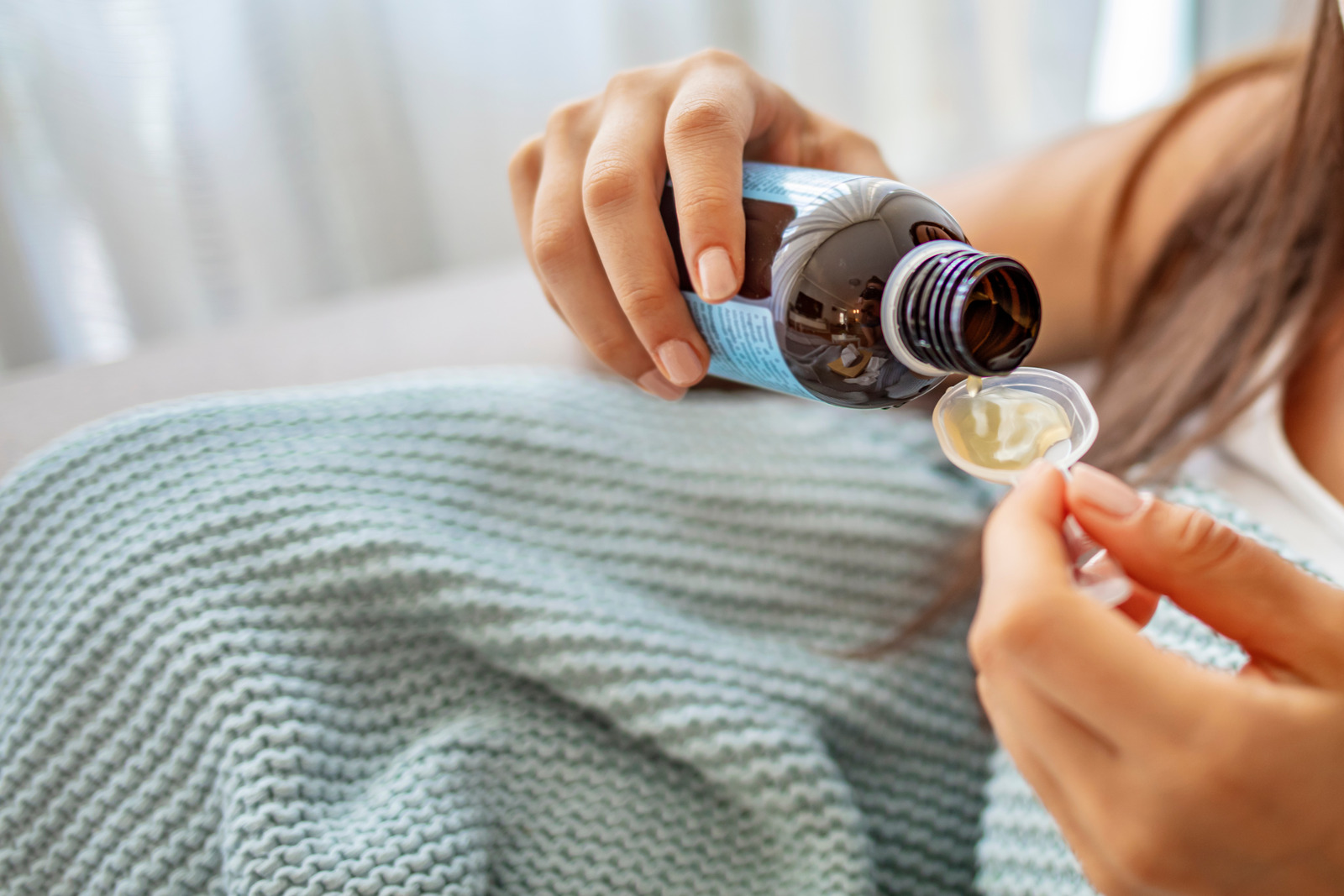NyQuil is a non-prescription medication primarily used to relieve common cold and flu symptoms. It reduces symptoms like coughing, sneezing, fever, or body aches.[1]
There are various formulations of NyQuil, such as ‘NyQuil Severe,’ ‘NyQuil Cough,’ and ‘NyQuil Cold & Flu.’ However, the most common ingredients of NyQuil include acetaminophen, dextromethorphan HBr (DXM), and doxylamine succinate. These drugs help relieve fevers and headaches, suppress coughs, and relieve allergy symptoms.
Certain NyQuil products may also contain phenylephrine HCI, a nasal decongestant, and small amounts of alcohol.
Why Does NyQuil Make You Sleepy?
One of the most common side effects of using NyQuil is drowsiness.[2] Individuals may feel sleepy after taking NyQuil because of the aftereffect of consuming the antihistamine doxylamine succinate. When histamine is blocked in the body, it can often cause drowsiness.
Other ingredients like dextromethorphan and alcohol in certain NyQuil products can also increase the sedative effects of the drug. Not all NyQuil products have the same ingredients, so it’s crucial to carefully review the label before taking any medication.
How Soon Do You Feel Sleepy After Taking NyQuil?
NyQuil usually starts to take effect within 30 minutes after ingestion. The drowsiness induced by NyQuil can vary from person to person depending on individual factors such as metabolism, body weight, and tolerance.[3]
However, most individuals report feeling the sleep-inducing effects within this same timeframe. It’s important to note that NyQuil is designed to last for several hours, typically providing relief from cold and flu symptoms and promoting sleep throughout the night. Due to this fact, it’s crucial to strictly follow the dosages and age restrictions listed on the label.
Should You Take NyQuil for Sleep?

While NyQuil can effectively help an individual experiencing cold symptoms get to sleep, it’s important to consider whether it’s the right choice for you.
If you’re struggling with sleep difficulties caused by cold or flu symptoms, then NyQuil’s sleep-inducing properties help relieve and promote rest. However, using NyQuil solely as a sleep aid isn’t generally recommended for several reasons:
- Risk of Overdose – One of the primary ingredients of NyQuil formulations is acetaminophen. This is a common ingredient in various over-the-counter medications. However, overuse of this drug can be detrimental to your health.[4] Regularly using NyQuil as a sleep aid can significantly increase the likelihood of accidental overdose of ingredients like acetaminophen, which can lead to liver damage and other life-threatening conditions.
- Adverse Side Effects—While drowsiness is a common side effect of using NyQuil that most people are aware of, there are also several other potential side effects that individuals should be aware of when taking drugs with acetaminophen in them.[5] These can include rash, hives, itching, and difficulty breathing or swallowing. Some people can also experience more prolonged daytime grogginess or impaired coordination after consuming NyQuil.
- Masking Underlying Issues—Although NyQuil can temporarily relieve cold and flu symptoms when used for longer periods, it can mask underlying sleep disorders or other medical conditions that need proper diagnosis and treatment. Conditions like sleep apnea, anxiety, or depression can have significant negative impacts on an individual’s long-term health, and if left untreated, they can get worse. If your sleep problems are consistent speak with a healthcare provider about other options for treatment.
Does NyQuil Ever Expire?
Yes, NyQuil does expire. Like most medications, its shelf life is designed to identify when it will be most effective and safe. The expiration date can typically be found on the packaging or the bottle.
For liquid NyQuil, it may be printed on the shoulder of the bottle, while for capsules or caplets, it may be located on the end flap of the carton or the back of the blister pack.
If you find a bottle of NyQuil that has passed its expiration date, discard it safely and purchase a new one. This ensures that you’re taking a safe and effective medication.
Can You Take NyQuil With Other Medications?
Combining NyQuil with other medications requires careful consideration due to the potential for interactions that could impact the effectiveness of either drug or even lead to more adverse side effects.
In particular, it’s important to be aware of any medications you’re taking that also contain acetaminophen, as this common pain reliever and fever reducer can be harmful in excessive doses. Overdosing on acetaminophen, which can happen unintentionally when combining multiple medications, can pose serious risks to the liver.
NyQuil can also amplify the sedative effects of other central nervous system depressants, like benzodiazepines, muscle relaxants, and some antidepressants. This interaction could result in extreme drowsiness, impaired coordination, and even trouble breathing.
Consult with a healthcare professional before taking NyQuil if you use other medications to ensure safety and efficacy. They can provide use guidance based on your circumstances and current prescriptions.
Can You Become Addicted to NyQuil?
NyQuil is not considered addictive in the traditional sense, as it doesn’t produce the physical dependence and withdrawal symptoms seen with drugs like opioids or benzodiazepines. However, there’s potential for developing a psychological dependence on NyQuil, especially with prolonged or excessive use.[6]
This psychological dependence can happen as a belief that you need NyQuil to fall asleep or manage cold and flu symptoms, even when those symptoms are mild or absent. You might experience anxiety or difficulty sleeping if you don’t have NyQuil on hand or if you try to stop taking it.
While NyQuil itself doesn’t contain any substances known to be physically addictive, one of its ingredients, doxylamine succinate, can lead to tolerance over time. This means your body may become less responsive to the medication’s sleep-inducing effects, requiring higher doses to achieve the same level of drowsiness. This can create a cycle of increasing dosage and reliance on the medication.
If you use NyQuil more often than recommended or feel like you can’t sleep without it, it’s important to consult a healthcare professional for assistance.

